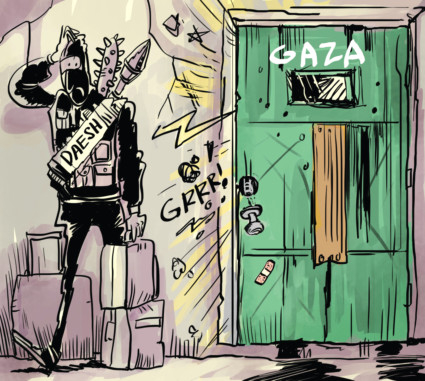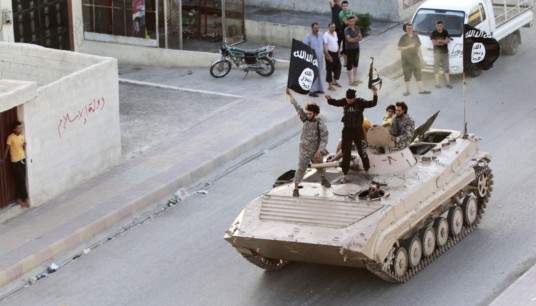
If you think Daesh (the self-proclaimed Islamic State of Iraq and the Levant) is going to dislodge Hamas in Gaza, sit in its place and establish its own style of fundamentalist rule, you may be much mistaken. Despite its belligerent threats, made last week through a videotape full of religious pomposity and derision of the kind of Islam that is practised on the Gaza Strip, Hamas is here to stay.
Riding on its erosion of different parts of Iraq and Syria and its strikes in Yemen, Egypt, Tunisia and Libya, as well as its mosque bombings in Saudi Arabia and Kuwait, Daesh has slowly developed a higher view of itself in its more archaic interpretation of Islam based on violence and little care for the other. In Gaza, however, they still need to make an actual, physical, geographical presence, in spite of their odd Salafist political supporters who are continually checked by Hamas.
Through thick and thin, Gaza remains Hamas territory, a quaint terrain where the Islamic movement has long learned and dominated the ropes of operation to fight against Israel’s blood-letting embargo and sanctions on the territorial enclave for no other apparent reason than just to get rid of Hamas and they have nowhere been as successful. Despite Israel’s 51-day war on the strip, whose first anniversary is on Wednesday, Hamas remains the political masters of Gaza through the tight control of the political, administrative, bureaucratic and security apparatuses. Its 35,000-strong men — 15,000 of which make up the Izz Aldin Al Qassam Brigade — today continues to stand as the military arm of the movement and is continually vigilant about any outside threat to it and will crack a hard blow to any force that would seek to undermine its security.
The question being repeatedly asked is that if Israel, through its military prowess, has not been able to eliminate Hamas, what chances will a military outfit such as Daesh, with its nefarious entourage of militiamen, have to achieve this on the streets of Gaza? In the Palestinian Territories, especially in the Gaza strip, the rules of political game differ very much from what the Daesh militiamen have been used to. Those terrorists are used to huge swaths of territories in middle and eastern Iraq, right up to northern Syria. However, this is clearly not the case in Gaza, the size of which is relatively small and where the screws can be tightened in a relatively small period of time.
Moreover, there is Israel to consider: Right on the doorstep of Gaza and the West Bank, coupled with its interference techniques in both territories. Apart from that, the Palestinian National Authority straddles Ramallah with its administrative, legislative council, institutions and strands of different security apparatuses. Then there is the Hamas-controlled Gaza that acts as a de facto government, along with its different statist paraphernalia.
Unlike anything the Daesh terrorists have ever been used to, this area of the Arab world is more economically, politically, socially — and from a security point of view more — developed, constructed and restructured along modern lines. A government is in place, along with civil society institutions, in Gaza and despite the clobbering it got from Tel Aviv, the authority of this government is stringently enforced through police and security forces.
None of these elements were in place in Iraq and Syria and all the other places that Daesh has made inroads into like Yemen and Libya, where there are raging civil wars. Daesh militiamen flourished in places of civil war and where the government and civil society institutions were withering away. This is what became of Iraq in the first decade of the millennium when former Iraqi president Saddam Hussain was forcibly removed from power by the United States. Similarly, in Syria, the group grew in areas where there was much fighting, little governance and where factional fighting became the order of the day, after the destructive civil war that the country found itself warped in after March 2011, when all hell broke loose in the name of Arab Spring. In Yemen, the same is true where state structures have long become the privy of different tribes and sects.
All these factors suggest Daesh is barking up the wrong tree if it really wants to expand into Gaza. Hamas leaders keep saying their presence in the strip is minimal and operate through proxy Salafist groups who have so far been quiet, not willing to raise the wrath of Hamas after its bloody showdown in 2009, in which dozens of their men were killed. From then on, they have kept a low profile up until now and especially when Daesh has started to make noises as of June last year when the group established its self-proclaimed ‘Caliphate’ in Riqqa, in northern Syria.
Of course things in Gaza have become more difficult every year with the ongoing economic blockade, firmly kept in place since 2007 when Hamas retreated into Gaza after it won the 2006 Palestinian legislative elections but was unable to form a government. The continuous wars by Israel on the strip — the last being in 2014 when more than 2,400 civilians were killed and the enormous destructions it created — are adding to popular frustrations in a land where unemployment stands at more than 44 per cent and where salaries of the 50,000 public employees are constantly paid late or cut-down because Hamas coffers are dwindling. This is owing to the fact that their aid, notably from Iran, is being cut owing to Tehran’s regional adventures in states like Syria and Yemen. These have all led to frustration.
While all these factors may not mean that people will follow the Salafists, who publicly announced their support for Daesh, it means anguish is growing among the people who may not see a change in their current situation and could become radicalised into supporting groups other than Hamas.
Two points here need to be taken into account. First, Hamas has realised that it has been making sound bytes and overtures for a long-term ceasefire with Israel through third parties, in an attempt to lift the economic blockade and improve the standards for Gazans. In so doing however, and that is the second point, it is already being portrayed by its enemies — and that primarily includes the Salafist groups — as selling itself to Israel. So it is a double-edged sword that may be capitalised on, not least of all by Daesh who may waiting in the wings.
Marwan Asmar is a commentator based in Amman. He has long worked in journalism and has a Phd in Political Science from Leeds University in the United Kingdom.









